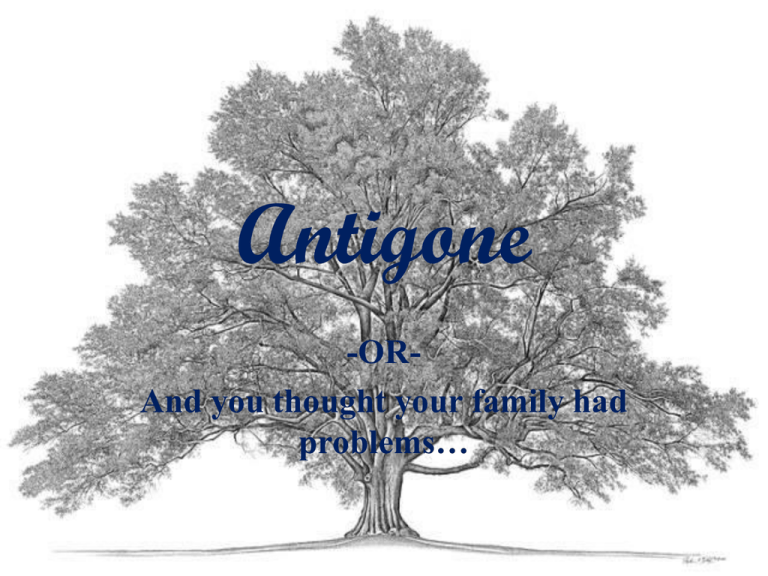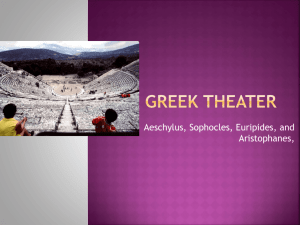Antigone Background Info
advertisement

Antigone -ORAnd you thought your family had problems… Greek Drama/Tragedy Terms Drama – written to be acted out for an audience Chorus – made up of elders whose age and opinions would be respected Choragus – leader of chorus; gave opinions on the story Ode – follows each scene; separates scenes (there was no curtain); provides a place for the chorus to respond to the previous scene Parados – first song chanted by chorus Strophe/antistrophe – part of the ode that the chorus chants as they move across the stage Tragedy – a work that involves serious and important events; main character comes to an unhappy end The Tragic Hero According to Aristotle’s Poetics, a tragic hero is, “"a [great] man who is neither a paragon of virtue and justice nor undergoes the change to misfortune through any real badness or wickedness but because of some mistake." The Tragic Hero- here are the characteristics 1. Noble or high-ranking 2. Hamartia- aka the tragic flaw (can be part of the character’s personality, an error in judgment, or a physical flaw) 3. Oftentimes the tragic flaw involves hubris: arrogant pride or overconfidence 4. Fall from power- this is usually the character’s own fault (due to hamartia) The Tragic Hero- here are the characteristics 5. The punishment for the character’s crime is usually worse than the actual crime 6. The fall is not pure loss. The hero learns something… Tragedy- why? Tragedies are meant to make you depressed- let’s just face it. Aristotle argues that one function of tragedy is to arouse the "unhealthy" emotions of pity and fear and through a catharsis cleanses us of those emotions. Catharsis - the purging of the emotions or relieving of emotional tensions, especially through certain kinds of art such as tragedy or music (dictionary.com) Greek Drama Grew out of ancient religious rituals honoring Dionysos (the god of wine and fertility). Thespis transformed hymns into songs that told the story of a famous hero or another god. Thespis has been immortalized in our word thespian - meaning actor or actress. The theater of Dionysos Looked like a semicircular football stadium. Seats were carved out of stone on a hillside. In the front was the orchestra; behind the orchestra was a platform for the actors. The theater (continued)... Actors wore masks with exaggerated mouthpieces to amplify their voices. All the actors were men. The story of Oedipus King Laios and Queen Jocasta learn from an oracle that their son will kill his father and marry his mother. They give their baby to a shepherd with orders to leave him on a lonely mountainside to die. The shepherd takes pity on the infant and gives him to a Corinthian shepherd. Who in turn gives the infant to the childless king and queen of Corinth. Oedipus’s story (continued)... The infant is named Oedipus, which means “swollen foot” or “club foot”. When Oedipus is a young man, he learns of the oracle’s prophecy and leaves Corinth, believing the king and queen are his birth parents. On his journey he runs into an old man who tries to run Oedipus off the road - they fight, and Oedipus kills him. Before reaching Thebes, Oedipus encounters the Sphinx - a monster with the wings of an eagle, body of a lion and the breasts and face of a woman. And the saga continues In order for Oedipus to pass on to Thebes, he must answer a riddle. Riddle: “What creature goes on four legs in the morning, two legs in the afternoon, and three legs in the evening?” Answer: Man Oedipus answers the riddle correctly, the Sphinx leaps into the sea, and Thebes is saved from the horrible monster. A Hero’s Welcome People of Thebes welcome Oedipus as their savior. Since the king had recently been killed, they offer the throne and the widowed queen as a reward. Oedipus & Iocaste Oedipus and Jocasta marry and have four children: 2 sons Polynieces and Eteocles; and 2 daughters Antigone and Ismene. A Dark Cloud Looms... All went well for Oedipus and Jocasta until a plague struck Thebes - desperate to learn the cause, Oedipus sends Iocaste’s brother, Creon, to the oracle at Delphi. A Horrible Discovery, or The Big “Oh Schnap”! The oracle warns that the plague will continue until Thebes punishes the murderer of King Laios - who is living among them unnoticed. Oedipus vows to save Thebes - and discovers that the man he had killed years ago was King Laios. He also learns that the king and queen of Corinth are not his biological parents - he was the son of King Laios and Queen Jocasta. Priestess of Delphi (1891) by John Collier; the Pythia was inspired by pneuma rising from below “We Did What?” When Oedipus and Jocasta discover the truth, she kills herself and he gouges out his eyes - to punish himself for having been blind to the truth. Creon takes over as acting ruler of Thebes and exiles Oedipus accompanied by Antigone he wanders the countryside as a beggar and dies in Colonus. God’s Law or Man’s? On returning to Thebes, Antigone finds that her 2 brothers have agreed to rule on alternating years. Eteocles rules first, but refuses to step down after a year. Polynieces flees to Argos, raises an army, and attacks Thebes. The Theban army is strong, but during the battle Eteocles and Polynieces kill each other. A Terrible Punishment Creon now becomes King of Thebes As his first law - he considers Polynieces a traitor, so therefore his body should be left to rot unburied outside the city gates. He gives Eteocles a hero’s burial. This goes against what the Greeks believe - their holiest laws demand that certain burial rites be performed, or else the soul of the dead person would be condemned to eternal unrest. Which Side Will You Take? Is it right to follow man’s law even when you know it’s morally wrong? Would you have the courage to disobey man’s law - even if the consequence was death? Who is right and who is wrong? You decide...



